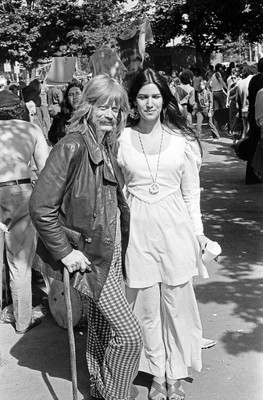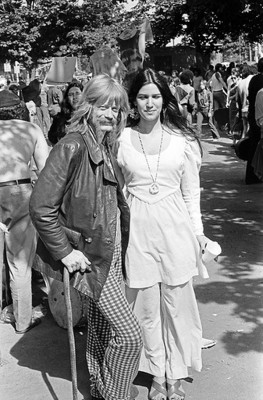 Hippies on the Boston CommonPhoto: Nick DeWolfeOne of the joys of demolition (in addition to anger management) is the hunt for treasure. When pulling apart old walls and closets you just can’t help dreaming about unearthing a cache of old coins or silverware (I’ve found both). Mostly pickings have been slim at the JP Green House — a few fragments of broken china, some old bottles, and a rusty pair of pliers — but under floorboards in the basement we uncovered a trove of newspapers from 1968, the Summer of Love.
Hippies on the Boston CommonPhoto: Nick DeWolfeOne of the joys of demolition (in addition to anger management) is the hunt for treasure. When pulling apart old walls and closets you just can’t help dreaming about unearthing a cache of old coins or silverware (I’ve found both). Mostly pickings have been slim at the JP Green House — a few fragments of broken china, some old bottles, and a rusty pair of pliers — but under floorboards in the basement we uncovered a trove of newspapers from 1968, the Summer of Love.
My favorite is the May 26, 1968, Boston Globe real estate section, with this feature article: “Hippies Cast Long Shadow: Property values, sales suffer.”
“The whole topic of hippies was the subject of some recent meetings of neighborhood businesses and property owners,” the Globe reported. “The congregation of hippie types and the demonstrations they bring with them, especially in the summer months, has had such a depressing effect on retail sales [along Charles St.] that they are off 30 percent.”
The article includes lengthy quotes from a report released that year by an association of realtors entitled “The Impact of Civil Disobedience on Property Values.” “What is particularly difficult to rationalize,” said the report, “is that most of these people are not among the disadvantaged in terms of education or background. With this group, it seems that civil disobedience is ‘fun and games’ and the current way of life.”
A Boston realtor lamented, “Another distressing factor is that most of these hippies do not even live in the immediate vicinity of the commercial districts they are affecting. They simply come into the area and congregate during the weekend evenings and generally raise hell.”
Casual comments by realtors and business owners willing to be quoted in Boston’s paper off-record give us an idea of race relations at the time.
“The drop in value attributed to hippie visibility was cited to show, according to [a Boston Realtor], that ‘the effects of civil disobedience on property values is not limited to Negro areas.'”
The executive director of the Beacon Hill Business Association said, “real progress can be made if the new-found spirit and awareness is not stunted by lack of financial support from the white community.”
The irony, of course, is that the very people who the Boston Globe reported in 1968 “were definitely hurting business and affecting property values on Beacon Hill” are now the most desirable customers and owners.


